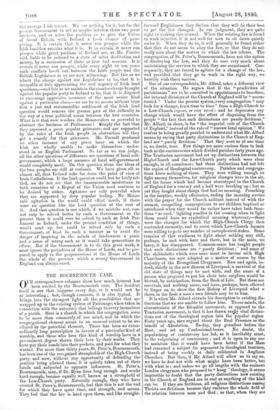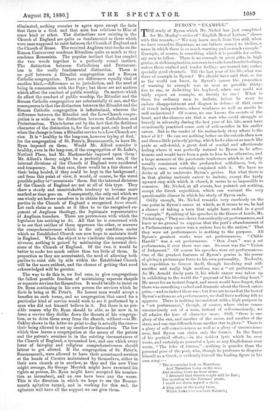THE BOURNEMOUTH CASE.
OUR correspondence columns show how much interest has been excited by the Bournemouth case. The incident itself is one that happens every day, or it would not be so interesting ; but, though common, it is also typical. It brings into the strongest light all the possibilities that are wrapped up in the existing system of Patronage, when taken in connection with the autocracy that belongs to every incumbent of a parish. Here is a church in which the congregation seem to be more than commonly of one mind, and in which the congregational element seems to an unusual extent to be un- alloyed by the parochial element. There has been an extra- ordinarily long prescription in favour of a particular kind of worship, and those who love this kind of worship have in a pre-eminent degree shown their love by their works. They have put their hands into their pockets, and paid for what they wanted. For more than thirty years, St. Peter's, Bournemouth, has been one of the recc,gnised strongholds of the High-Church party, and now, without any opportunity of defending the position being allowed them, it is quietly taken out of their hands and subjected to opposite influences. St. Peter's, Bournemouth, may, if Dr. Ryan lives long enough and works hard enough, become equally well known as a stronghold of the Low-Church party. Naturally enough, they who have created St. Peter's, Bournemouth, feel that this is not the end for which they have spent time, and strength, and means. They feel that the law is hard upon them, and like straight-
forward Englishmen they declare that they will do their best to get the law changed. In our judgment, they are quite right in making this avowal. When the existing law is found to work injustice, it is not well for men to sit down quietly under it. When they do so, it will generally be found either that they do not mean to obey the law, or that they do not really care about the matter to which the law relates. The congregation of St. Peter's, Bournemouth, have not the option of disobeying the law, and they do care very much about maintaining the services to which they are accustomed. Con- sequently, they are forced to agitate for a change of the law, and provided that they go to work in the right way, we heartily wish them success.
One of our correspondents, Mr. Alford, takes a different view of the situation. He argues that if the "proclivities of parishioners" are to be consulted in appointments to benefices, the internal divisions of the Church of England will be "accen- tuated." Under the present system, every congregation "may look for a change, from time to time" from a High-Church to a Low-Church regime, or vice versa; and he deprecates any change which would have the effect of disguising from the people "the fact that such distinctions are purely fictitious." Mr. Alford, in short, is for "the imperial rule of the Church of England," instead of the rule of "narrow local opinion." We confess to being greatly puzzled to understand what Mr. Alford means by saying that party distinctions in the Church of Eng- land are "purely fictitious." That they were so at one time is, no doubt, true. Few things are more curious than to look back at the controversies which divided parishes forty years ago. The Tractarian movement had set up distinctions between the High-Church and the Low-Church party which were clear enough, in all conscience ; but these distinctions had not left the region of theological controversy. Parishes and congrega- tions knew nothing of them. They were willing enough to fight among themselves, for religious changes were in the air, and the forms which had become stereotyped in the Church of England for a century and a half were breaking up ; but as yet they fought about things that had no meaning. Preaching in the surplice, weekly offertories, ending the morning service with the prayer for the Church militant instead of with the sermon, compelling congregations to see children baptised or catechised when they would far rather have taken both func- tions "as read," lighting candles in the evening when to light them could have no symbolical meaning whatever,—these were the changes for which the High-Church Clergy then contended earnestly, and to resist which Low-Church laymen were willing to go to any number of metaphorical stakes. Some remains of this readiness to fight about nothing may still, perhaps, be met with here and there, but in the main, we fancy, it has disappeared. Common-sense has taught people that such distinctions are "purely fictitious ;" and some of the shibboleths which were once most in favour with High Churchmen, are now adopted as a matter of course by the majority of the Evangelical Clergymen. Now and again, in- deed, chiefly in the new diocese of Liverpool, a survival of the old state of things may be met with, and the name of a parson who proposed to put his choir into surplices would be blotted, by anticipation, from the Book of Life. But these are survivals, and nothing more, and have, perhaps, been allowed to linger on to show the first Bishop of Liverpool what a thorn in the flesh a man's own friends may be to him.
It is when Mr. Alford extends his description to existing dis- tinctions that we are unable to follow him. To our minds, the characteristic of the Ritualist movement, as opposed to the Tractarian movement, is that it has drawn reapy vital distinc- tions out of the theological region into the popular region Forty years ago, men argued about the Real Presence or the benefit of Absolution. To-day, they genuflect before the
Host, and set up Confessional-boxes. No doubt, the popularising of controversy has led, as it inevitably must, to the vulgarising of controversy ; and it is open to any one to maintain that it would have been better if the Mass had remained a subject for argument in theological treatises, instead of being weekly or daily celebrated in Anglican Churches. But then, if Mr. Alford will allow us to say so, we have to deal not with what might have been better, but with what is ; and unless we go all lengths with the eminent London clergyman who proposed to " hang' theology, it seems impossible to doubt that the party distinctions now existing in the Church of England are as real as anything of the kind can be. If they are fictitious, all religious distinctions among Theists are fictitious, because they embrace the whole field of the relation between man and God ; so that, when they are eliminated, nothing remains to agree upon except the facts that there is a God, and that man has relations to Him of some kind or other. The distinctions now existing in the Church of England are quite as fundamental as those which were once supposed to exist between the Church of England and the Church of Rome. The received Anglican text-books on the Roman Controversy condemn Ritualism quite as much as they condemn Romanism. The popular instinct that has coupled the two words together is a perfectly sound instinct. The distinction between Catholicism and Protestant- ism is the really fundamental distinction. There is no gulf between a Ritualist congregation and a Roman Catholic congregation. There are differences equally vital of another kind,—differences as to jurisdiction, and the need of being in communion with the Pope ; but these are not matters which affect the conduct of public worship. On matters which do affect the conduct of public worship, the Ritualist and the Roman Catholic congregation are substantially at one, and the consequence is that the distinction between the Ritualist and the Roman Catholic congregation is infinitesimal, whereas the difference between the Ritualist and the Low-Church congre- gation is as wide as the distinction between Catholicism and Protestantism. This is borne out by the fact that the fictitious character of the distinction is, for the most part, only heard of when the change is from a Ritualist service to a Low-Church ser- vice. It is "healthy in the long-run, however trying at first," for the congregation of St. Peter's, Bournemouth, to have Dr. Ryan imposed on them. Would Mr. Alford consider it healthy, even in the long-run, if the congregation of St. Luke's, Nutford Place, had Mr. Mackonochie imposed upon them ? Mr. Alford's theory might be a perfectly sound one, if the internal divisions of the Church of England were accidental and temporary. In that ease, there would be a fair chance of their being healed, if they could be kept in the background ; and from this point of view, it would, of course, be the worst possible policy to " accentuate " them. But the internal divisions of the Church of England are not at all of this type. They show a steady and unmistakable tendency to become more marked as time goes on. Consequently, the only end which we can wisely set before ourselves is to obtain for each of the great parties in the Church of England a recognised locus standi. Let each claim as much as it likes to be the recognised ex- ponent of Anglican theology, the legitimate representative of Anglican founders. These are pretensions with which the legislator has nothing to do. All that he is concerned with is to see that neither of them oppresses the other, or narrows the comprehensiveness which is the only condition under which an Established Church can now hope to maintain itself in England. When the object is to vindicate this comprehen- siveness, nothing is gained by minimising the internal divi- sions of the Church of England. Of the two, it would be better to make too much rather than too little of them. In proportion as they are accentuated, the need of allowing both parties to exist side by side within the Established Church will be the more evident, and the chance of getting that need acknowledged will be greater.
The way to do this is, we feel sure, to give congregations the fullest possible freedom of maintaining separate chapels or separate services for themselves. It would be idle to insist on Dr. Ryan continuing in his own person the services which he finds in being at St. Peter's. No honest man would accept a benefice on such terms, and no congregation that cared for a particular kind of service would wish to see it performed by a man who did not himself believe in it. But there is no pos- sible reason why Dr. Ryan should be able, as he now is, to force a service they dislike down the throats of his congrega- tion, or to drive them away from the church, without—as Mr. Oakley shows in the letter we print to-day is actually the case— their being allowed to set up another for themselves. The law which thus leaves a congregation at the mercy of the patron and the patron's nominee is, in the existing circumstances of the Church of England, a tyrannical law, and one which every lover of fair-play and religious comprehensiveness should labour to get altered. If the congregation of St. Peter's, Bournemouth, were allowed to have their accustomed services at the hands of Curates maintained by themselves, either in their own church or in another, as they and the new Vicar might arrange, Sir George Meyrick might have exercised his rights as patron, Dr. Ryan might have accepted his nomina- tion as incumbent, and no one have been any the worse. This is the direction in which we hope to see the Bourne- mouth agitation turned, and in working for this end, the agitators will have all the support we can give them.































 Previous page
Previous page